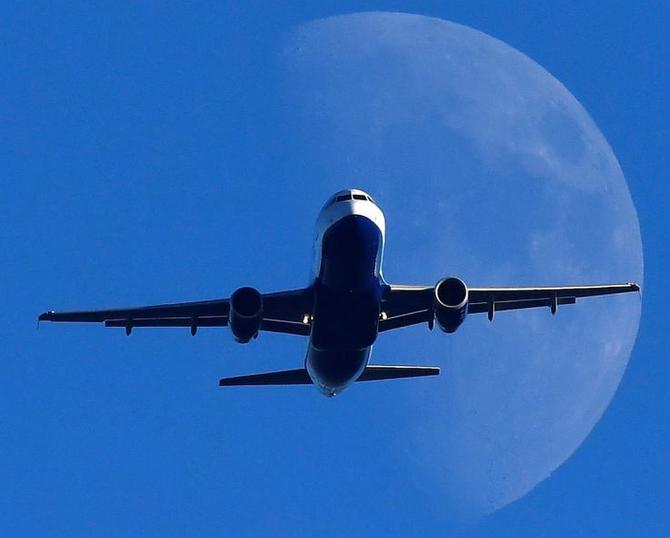Rising crude oil prices and muted passenger traffic in the July-September quarter (second quarter, or Q2) of 2023-24 (FY24) have raised concerns about the profitability of listed aviation players.

These two concerns have caused the stock of InterGlobe Aviation (IndiGo), the largest player in the sector, to slip by 11 per cent since its highs at the end of July.
Nuvama Research expects yields to cool down in the near term due to seasonality, rising crude oil prices, and higher capacity.
Brent crude prices have risen by 18 per cent since the start of July and are expected to push up fuel costs of aviation majors in Q2FY24.
Oil-marketing companies (OMCs) raised aviation turbine fuel, or ATF, prices on September 1 by as much as 14.1 per cent.
This is the third successive hike by OMCs, taking the total increase from June 1 until now to 26 per cent.
Brokerages had expected double-digit growth in ATF prices due to the widening gap between crude oil and aviation fuel prices, leading to a revision in estimates for the September quarter.
Q2FY24 may see a small loss as compared to earlier estimates of a profit.
According to analysts of IIFL Research, led by Joseph George, “A 10 per cent increase in ATF price would be neutralised by a 4 per cent increase in yield.
"Given the strong demand and low competitive intensity, we believe this is achievable.
"However, September is a seasonally weak month; it is even weaker this year due to the push-out of the festival season into October.
"This may result in a pricing shortfall in September, leading to Q2 being a small loss for IndiGo as compared to our earlier estimate of a small profit.”
Fuel is by far the biggest cost for airline majors.
In the January-March quarter of 2022-23, fuel costs, as a proportion of sales from operations, were nearly 40 per cent. Lower ATF prices, coupled with record revenues, however, helped the company bring it down to 31 per cent in the April-June quarter.
Given the higher costs in the September quarter, a lot will depend on demand momentum and the ability to hike prices to offset cost increase. July has been a weak month (seasonal), witnessing a 3 per cent month-on-month decline in passenger volumes to 12.1 million.
IndiGo’s passenger load factor was down over 700 basis points (bps) over June to 83.7 per cent, while that for SpiceJet was down 470 bps to 88.9 per cent in July.
August has seen some recovery, with passenger volumes pegged at 12.6 million, which is 4 per cent higher than July and 24 per cent year-on-year.
Load factors for the market leader are expected to have improved by over 200 bps to 86 per cent.
In addition to the bounce-back of volumes, two other factors that should help the market leader, which has a 63 per cent market share of the domestic market, are the rising proportion of higher-yielding international routes and supply pressures.
Brokerages have highlighted that Indian companies are diverting a part of their fleet to international routes to expand their presence and improve their yields.
Domestic carriers gained 900 bps of market share on international routes in the June quarter.
Kotak Institutional Equities highlights that IndiGo has been the biggest beneficiary of this trend, gaining 700 bps of the overall gain.
The shift to international is positive for the spreads of airlines, especially IndiGo, say Aditya Mongia and Sai Siddhardha Pasupuleti of the brokerage.
Manufacturing and supply issues would mean a tight supply market in calendar years 2023 and 2024.
ICICI Securities highlights that original equipment manufacturers (airline makers) and weak airline balance sheets have meant that India has had a stagnant fleet of 650-700 for the past four years.
“Supply shortages should aid profitability, which remains our investment thesis on InterGlobe Aviation, notwithstanding any seasonal weakness,” say analysts of the brokerage, led by Ansuman Deb.
While most brokerages have a ‘buy’ rating on IndiGo, multiple uncertainties for SpiceJet are keeping brokerages from taking a positive stance.
The process of infusing funds into SpiceJet by promoters, converting lease liabilities into equity, and restructuring (hiving off cargo business) should considerably deleverage the company’s balance sheet.
Further, the addition of the 737-8 MAX aircraft could buttress growth, given its higher capacity (220 seats versus 180 in the 737 Next Generation) and better fuel efficiency (20 per cent more efficient).
Nuvama Research, however, has a ‘hold’ rating, given the lack of transparency for investors, a spin-off of the cargo business, 40 per cent of aircraft staying grounded, the inability to raise funds, and a weak balance sheet.
Disclaimer: This article is meant for information purposes only. This article and information do not constitute a distribution, an endorsement, an investment advice, an offer to buy or sell or the solicitation of an offer to buy or sell any securities/schemes or any other financial products/investment products mentioned in this article to influence the opinion or behaviour of the investors/recipients.
Any use of the information/any investment and investment related decisions of the investors/recipients are at their sole discretion and risk. Any advice herein is made on a general basis and does not take into account the specific investment objectives of the specific person or group of persons. Opinions expressed herein are subject to change without notice.











